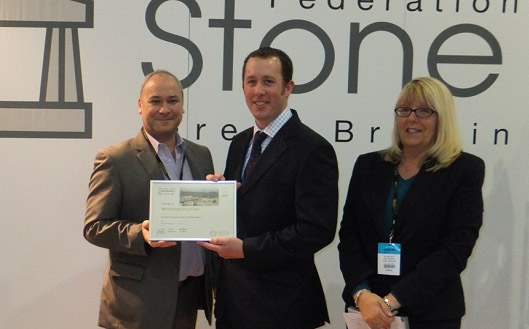The awards were created to highlight the sustainable qualities of natural stone and to recognise and reward outstanding achievement, awareness and innovation in sustainability within the industry. It is the third year they have been held.
A project designed to generate its own electricity has seen Dorset company Lovell Purbeck win one of the awards. There were also awards for Guernsey’s Granite Le Pelley for their work in refurbishing and extending a hotel on the Isle of Sark, and for Hardscape from Bolton for a project in Nelson town centre.
Winners were announced, and awards presented, at the Natural Stone Awards Sustainability Day at EcoBuild at ExCel in London on March 22.
Chairing the judging panel was Ingval Maxwell OBE, who qualified as an architect in 1969 and then spent his entire professional career dealing with the conservation of ancient monuments and historic buildings until his retirement from Historic Scotland in 2008.
Also judging were David Richardson, Director of the Building Research Establishment’s Building Technology Group and John Bysouth, recipient of the Duke of Gloucester Gold Medal for Outstanding Lifetime Achievement in Stonemasonry.
The Awards were organised by Stone Federation Great Britain with sponsorship from BRE and EcoBuild.
The award in the category for “Workshops and Premises” went to Lovell Purbeck, which in the last year has been investing heavily in generating its own electricity at Downs Quarry in Purbeck and Bowdens Quarry in Somerset
A photo voltaic generation system has been installed on the roof of the company’s new tile processing factory at Downs Quarry and is able to generate 20 per cent of the company’s total electricity requirements for the processing facility.
When processing is not taking place surplus electricity is fed back to the national grid.
A similar, but slightly smaller, system at its Bowdens Quarry produces enough electricity to run all of the processing equipment, making the site self sufficient in electricity.
Lovell Purbeck has invested over £230,000 in the schemes and expects payback in less than ten years.
Managing Director Simon Hart said “Of course it is really good news to have won this award. Sustainability is a key issue throughout our company. It is always very high on the agenda, as it should be.
”We have been making substantial investments and it makes sense that these should be environmentally friendly.”
An award for “landscaping” went to Hardscape for a project in Nelson, Lancashire.
Following a decline in retail trade Pendle Borough Council was granted funding of £2.3 million to recreate “The High Street” in an attempt to regenerate the town centre. This included reintroducing slow moving traffic to a previously pedestrianised precinct.
But following changes in funding the council was asked to cut the cost of the scheme by £200,000 and complete the programme in twelve months instead of the planned fifteen. This was achieved through strong project management skills.
A mixture of high quality locally sourced natural stone and manmade materials have produced a visually pleasing but robust scheme.
Stone paving flags to the pedestrian movement zones, stone setts to crossing points and hot rolled asphalt coloured buff has provided durability to the vehicle route.
Anthony Collins, North West sales manager for Hardscape said “together with Pendle Borough Council we are delighted the project received the award.
From providing locally sourced materials where possible to being leading members of the Ethical Trading Institute, Hardscape continues to ensure sustainable inspiration, selection and supply of hard landscaping materials to clients across the UK. “
The award for “Re-use of materials” went to Granite Le Pelley for a project at La Moinerie Hotel on Sark. This utilised material from derelict 18th century granite farm buildings surrounding the hotel.
The owners wanted to sensitively renew and refurbish the existing hotel and add new bedrooms and a restaurant. A very traditional cottage style was adopted to remain in keeping with the existing buildings.
The method of construction was designed to suit the skills of labour available on the island and in order to support the island’s economy a local building contractor was appointed to oversee the works.
The re-use of materials included reclaimed random granite walling from derelict buildings and reclaimed granite setts and cubes obtained from Brittany. The latter became available as existing cobbled streets were dug up and replaced with modern materials.
Other sustainable features included a central oil fired boiler with insulated pipe work, a water management infrastructure and additional boreholes to provide a water supply.
Roof rainwater is collected and used on the nearby market garden which supplies the hotel with organic fresh vegetables.
Granite Le Pelley managing director Phil Le Roy said ““I am absolutely delighted with this prestigious award. I have worked with our clients, Sark Estate Management, for well over two years and I know that they will also be delighted.
“As well as building and refurbishing as sustainably as possible, our clients have a vision to grow, rear and catch from the sea as much of the produce they require as possible. With their extensive vineyards, market gardens, greenhouses and supplies from local farmers and fishermen, they are very much on their way.”
Jane Buxey, Chief Executive of Stone Federation Great Britain said “In this modern world sustainably has become an increasingly important issue and it is right that we acknowledge those members of the natural stone industry who incorporate it as a key consideration when undertaking projects.”


